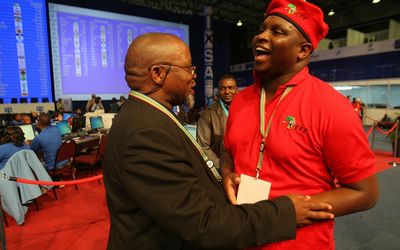WITH a decisive electoral victory in hand, African National Congress (ANC) leaders on Thursday underlined the urgency of getting the economy right and of the need for continuity in government economic programmes and policies over the next five years.
Projections on Thursday put the ANC’s share of the final vote at 63.3%, down 2.6% percentage points on its 2009 majority. This was despite a tough campaign, in which one of its alliance partners, the Congress of South African Trade Unions, was partly demobilised by factionalism, there was an escalation of community protests in the months before the vote, and there was fierce contestation from opposition parties to right and the left.
According to projections by the Council for Scientific and Industrial Research (CSIR) — which are typically accurate within 0.5% percentage points — the Democratic Alliance (DA) will finish with 22% of the vote, followed by the Economic Freedom Fighters (EFF) with 4.8% and the IFP with 2.4%.
The big losers are the Congress of the People (COPE), Agang SA, the Pan Africanist Congress and the Azanian People’s Organisation — the last three of which may not secure a single seat in Parliament.
Actual counting was still under way on Thursday night with 70% of the vote counted by 6pm. The final results are expected on Saturday. Out of counted votes at that time, the ANC had 62.95%, the DA had 22% and the EFF had 5.36%.
Chief electoral officer Mosotho Moepya said the turnout in the voting districts captured so far was a steady 72.85%. This is slightly lower than the 2009 turnout of 75%.
"At this rate it would seem as if we are on course to see over 18-million votes cast in this national election," Mr Moepya said. "This will exceed the 17.9-million votes cast in 2009 and the 15.6-million votes cast in 2004 ."
The head of the ANC’s election campaign, Malusi Gigaba, said yesterday the party’s leaders were aware of the need to get the economy growing in an inclusive manner. "We need to ensure continuity of our economic policy and programme and we must embed the National Development Plan (NDP) in the work of government in the next five years," he said.
To do that would require that all ministers, provincial MECs and mayors "pursue the same agenda", Mr Gigaba said. Over the past two years, since the Cabinet adopted the NDP, there have been examples of departmental policies and programmes adopted in direct contradiction. These include important areas such as labour market policy, economic regulation and red tape, and energy pricing.
ANC treasurer-general Zweli Mkhize said the starting point for the economy remained the NDP, which invited a greater engagement between the government and the private sector. "We want to see bolder steps from the private sector to say this is how it is going to support the NDP in its own planning.
"The government and business need to build the country together. The biggest issue is the issue of trust, and the gap between the private sector and the government will have to be narrowed.
"The lesson we have learned is that there is no us and them and South Africa’s economic development depends on all participants," Mr Gigaba added.
While there is no indication yet of the choices that ANC president Jacob Zuma will make for his Cabinet following his inauguration on May 24, party insiders are not expecting extensive change to the economics team. Rumours about the future of Finance Minister Pravin Gordhan and possible replacements have been reported in recent months. But Mr Gordhan is high on the ANC’s national list at number 13, an indication of his standing in the party.
While the ANC’s overall showing is expected to decline marginally, the DA’s has improved. Should the CSIR projections hold, the DA is likely to be "the biggest winner" of the election with a growth of 5.4 percentage points. The party was likely to become the opposition in three new provinces — the Northern Cape, Eastern Cape and Free State — where COPE was formerly the second-biggest party.
Further, it could become the official opposition in a fourth province, KwaZulu-Natal, displacing the Inkatha Freedom Party.
DA leader Helen Zille said it had been tough for the party to increase its share of the poll, though she was pleased with the outcome. But i t was disappointing that the ANC was likely to get above 60%.
Lindiwe Mazibuko, the DA’s caucus leader, expressed satisfaction about the results. "According to the projections, we grew more than any other party, which would make us the biggest winner, even though we did not win the national election," she said. "We are particularly pleased with the Western Cape where voters have given us a bigger mandate than ever before ."
Projections put the DA’s provincial share of the vote in the Western Cape at 57%, up from 51.46% in 2009. The DA could double its share of the vote in the Eastern Cape, from 7.4% in 2009 to a predicted 15.6%.
While the DA began the campaign aiming for 30% of the national vote, Ms Mazibuko said this had been "an internal number to guide how we structured our campaign".
The EFF looks set to become the opposition in Limpopo where it will displace the DA by taking 10% of the vote. In North West, where the EFF expected to do particularly well because of its support among platinum mine workers, it could also get about 10% of the vote.
With Natasha Marrian

ANC secretary-general Gwede Mantashe chats with EFF political commissar Floyd Shivambu at the Electoral Commission of SA's results centre in Pretoria where representatives of parties gathered to see poll results as they came in after the May elections. Picture: VELI NHLAPO
WITH a decisive electoral victory in hand, African National Congress (ANC) leaders on Thursday underlined the urgency of getting the economy right and of the need for continuity in government economic programmes and policies over the next five years.
Projections on Thursday put the ANC’s share of the final vote at 63.3%, down 2.6% percentage points on its 2009 majority. This was despite a tough campaign, in which one of its alliance partners, the Congress of South African Trade Unions, was partly demobilised by factionalism, there was an escalation of community protests in the months before the vote, and there was fierce contestation from opposition parties to right and the left.
According to projections by the Council for Scientific and Industrial Research (CSIR) — which are typically accurate within 0.5% percentage points — the Democratic Alliance (DA) will finish with 22% of the vote, followed by the Economic Freedom Fighters (EFF) with 4.8% and the IFP with 2.4%.
The big losers are the Congress of the People (COPE), Agang SA, the Pan Africanist Congress and the Azanian People’s Organisation — the last three of which may not secure a single seat in Parliament.
Actual counting was still under way on Thursday night with 70% of the vote counted by 6pm. The final results are expected on Saturday. Out of counted votes at that time, the ANC had 62.95%, the DA had 22% and the EFF had 5.36%.
Chief electoral officer Mosotho Moepya said the turnout in the voting districts captured so far was a steady 72.85%. This is slightly lower than the 2009 turnout of 75%.
"At this rate it would seem as if we are on course to see over 18-million votes cast in this national election," Mr Moepya said. "This will exceed the 17.9-million votes cast in 2009 and the 15.6-million votes cast in 2004 ."
The head of the ANC’s election campaign, Malusi Gigaba, said yesterday the party’s leaders were aware of the need to get the economy growing in an inclusive manner. "We need to ensure continuity of our economic policy and programme and we must embed the National Development Plan (NDP) in the work of government in the next five years," he said.
To do that would require that all ministers, provincial MECs and mayors "pursue the same agenda", Mr Gigaba said. Over the past two years, since the Cabinet adopted the NDP, there have been examples of departmental policies and programmes adopted in direct contradiction. These include important areas such as labour market policy, economic regulation and red tape, and energy pricing.
ANC treasurer-general Zweli Mkhize said the starting point for the economy remained the NDP, which invited a greater engagement between the government and the private sector. "We want to see bolder steps from the private sector to say this is how it is going to support the NDP in its own planning.
"The government and business need to build the country together. The biggest issue is the issue of trust, and the gap between the private sector and the government will have to be narrowed.
"The lesson we have learned is that there is no us and them and South Africa’s economic development depends on all participants," Mr Gigaba added.
While there is no indication yet of the choices that ANC president Jacob Zuma will make for his Cabinet following his inauguration on May 24, party insiders are not expecting extensive change to the economics team. Rumours about the future of Finance Minister Pravin Gordhan and possible replacements have been reported in recent months. But Mr Gordhan is high on the ANC’s national list at number 13, an indication of his standing in the party.
While the ANC’s overall showing is expected to decline marginally, the DA’s has improved. Should the CSIR projections hold, the DA is likely to be "the biggest winner" of the election with a growth of 5.4 percentage points. The party was likely to become the opposition in three new provinces — the Northern Cape, Eastern Cape and Free State — where COPE was formerly the second-biggest party.
Further, it could become the official opposition in a fourth province, KwaZulu-Natal, displacing the Inkatha Freedom Party.
DA leader Helen Zille said it had been tough for the party to increase its share of the poll, though she was pleased with the outcome. But i t was disappointing that the ANC was likely to get above 60%.
Lindiwe Mazibuko, the DA’s caucus leader, expressed satisfaction about the results. "According to the projections, we grew more than any other party, which would make us the biggest winner, even though we did not win the national election," she said. "We are particularly pleased with the Western Cape where voters have given us a bigger mandate than ever before ."
Projections put the DA’s provincial share of the vote in the Western Cape at 57%, up from 51.46% in 2009. The DA could double its share of the vote in the Eastern Cape, from 7.4% in 2009 to a predicted 15.6%.
While the DA began the campaign aiming for 30% of the national vote, Ms Mazibuko said this had been "an internal number to guide how we structured our campaign".
The EFF looks set to become the opposition in Limpopo where it will displace the DA by taking 10% of the vote. In North West, where the EFF expected to do particularly well because of its support among platinum mine workers, it could also get about 10% of the vote.
With Natasha Marrian














 News, views and analysis of South Africa's national and provincial elections
News, views and analysis of South Africa's national and provincial elections









Change: -0.47%
Change: -0.57%
Change: -1.76%
Change: -0.34%
Change: 0.02%
Data supplied by Profile Data
Change: -1.40%
Change: -0.42%
Change: -0.47%
Change: 0.00%
Change: -0.47%
Data supplied by Profile Data
Change: 1.21%
Change: 1.34%
Change: 1.02%
Change: 0.88%
Change: 1.05%
Data supplied by Profile Data
Change: 0.00%
Change: -0.52%
Change: 0.26%
Change: -1.38%
Change: -2.05%
Data supplied by Profile Data